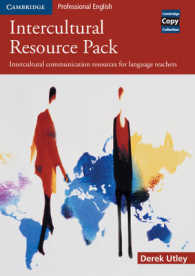- ホーム
- > 洋書
- > 英文書
- > Politics / International Relations
基本説明
New in paperback. Hardcover was published in 2007. This book connects the study of democratization in Eastern Europe and Russia to the emergence and crisis of communism.
Full Description
Before democracy becomes an institutionalised form of political authority, the rupture with authoritarian forms of power causes deep uncertainty about power and outcomes. This book connects the study of democratisation in eastern Europe and Russia to the emergence and crisis of communism. Wydra argues that the communist past is not simply a legacy but needs to be seen as a social organism in gestation, where critical events produce new expectations, memories and symbols that influence meanings of democracy. By examining a series of pivotal historical events, he shows that democratisation is not just a matter of institutional design, but rather a matter of consciousness and leadership under conditions of extreme and traumatic incivility. Rather than adopting the opposition between non-democratic and democratic, Wydra argues that the communist experience must be central to the study of the emergence and nature of democracy in (post-) communist countries.
Contents
1. Communism and democracy - a problematisation; Part I. The Experiential Basis of Communism and Democracy: 2. Revolutions, transitions, and uncertainty; 3. The political symbolism of communism; 4. Experiencing democratic transformations; Part II. Critical Events and their Symbolisations: 5. The rise of Bolshevik power; 6. The emergence of the Cold War; 7. The articulation of dissidence; 8. The collapse of communism; Part III. Democracy as a Process of Meaning-Formation: 9. The power of memory; 10. The future that failed; 11. Democracy as a civilising process.








